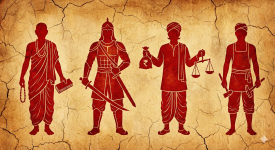Welcome to विचारमञ्जरी (Vichāramañjarī)!
Vichāramañjarī is a space for the contemplative mind. Here, we delve into the depths of thought, exploring the intricate tapestry of ideas that shape our understanding of the world.
We believe in the power of shared reflection, where curiosity and creativity intertwine to illuminate the complexities of human experience. Our blog is a platform for those seeking to engage in thoughtful discourse, to grapple with challenging questions, and to discover new perspectives on familiar themes.
We invite you to join us on this journey of intellectual exploration. Engage with our content through thoughtful comments and discussions, and contribute your own insights to the collective tapestry of knowledge.
Vichāramañjarī is a haven for those who seek to engage with the world through the lens of critical thought and profound contemplation.
Featured
Varna| The Natural Order We Refuse to Acknowledge
Posted on 4 mins
The traditional varna system has become a convenient target for modern criticism—dismissed as an archaic hierarchy incompatible with democratic values. Yet something curious happens when you observe contemporary society closely: the patterns that varna described haven’t disappeared. They’ve simply gone underground, operating informally while we collectively pretend they don’t exist. What Actually Happens Strip away the rhetoric about equal opportunity and meritocracy, and look at the facts. The child of lawyers becomes a lawyer.
The Rational Apathy | Why India's Borrowed Framework Breeds Dysfunction
Posted on 6 mins
The casual observer might blame India’s civic dysfunction on cultural deficiency or innate selfishness. The streets are filthy, systems are routinely exploited, and apathy seems universal. But this explanation is too convenient—it mistakes symptom for cause. The real answer lies not in the character of Indians, but in the nature of the system they inhabit. The Paradox of Rational Selfishness Consider a simple game theory experiment: two players must independently choose between options A and B.
The Performance Problem | On Authenticity and Language in Modern India
Posted on 6 mins
There’s a peculiar phenomenon that runs through the fabric of contemporary Indian society—an overwhelming emphasis on appearance over substance, on the performance of values rather than their practice. From religious observance to professional life, from political discourse to educational pursuits, the culture has become profoundly ornamental. The talk is loud, but the sincerity is thin. The Politics of Symbols Nowhere is this performative tendency more evident than in political discourse.
The Scale Problem | Why Large Democracies Struggle with Social Revolution
Posted on 7 mins
TLDR - Summary: Large democracies face unique challenges that smaller nations avoid. India’s billion-plus population hasn’t created mathematical impossibility of consensus—it has culturally chosen to grant permanent veto power to street protests, making electoral democracy meaningless when any small group can endlessly occupy public spaces without consequence. While America demonstrates that democracies can be agile despite polarization (swinging between extremes every four years), India remains paralyzed by its need to accommodate everyone, ultimately accommodating no one.